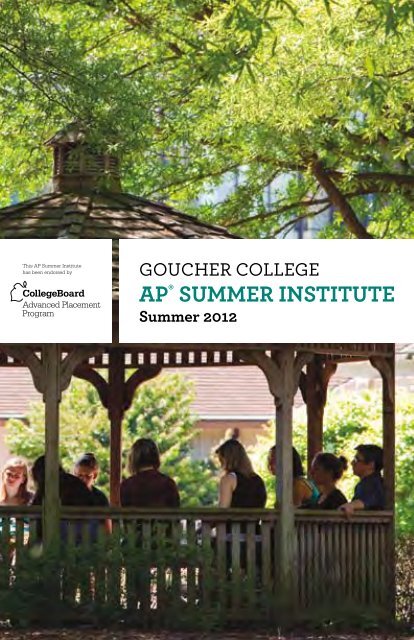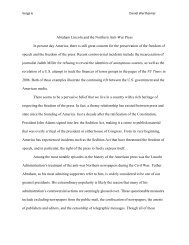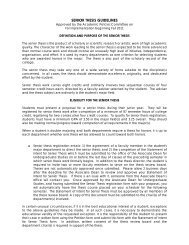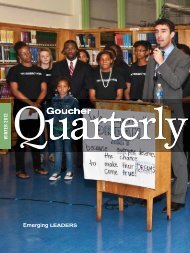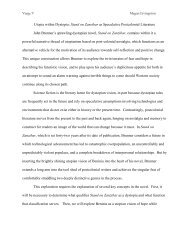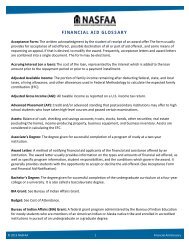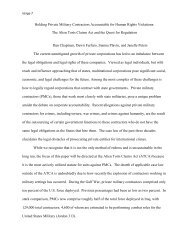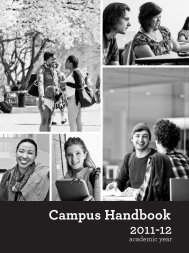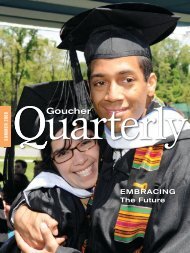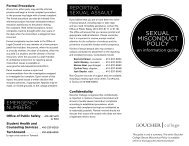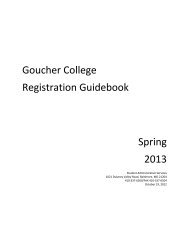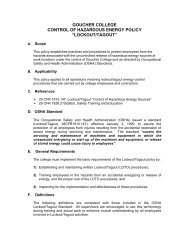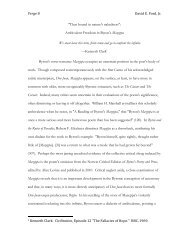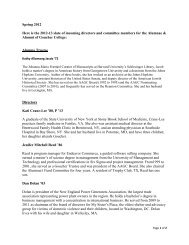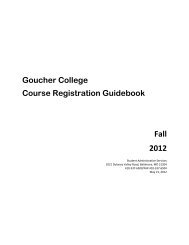AP® Summer InStItute - Goucher College
AP® Summer InStItute - Goucher College
AP® Summer InStItute - Goucher College
Create successful ePaper yourself
Turn your PDF publications into a flip-book with our unique Google optimized e-Paper software.
<strong>Goucher</strong> <strong>College</strong><br />
AP ® <strong>Summer</strong> Institute<br />
<strong>Summer</strong> 2012
What Makes<br />
<strong>Goucher</strong>’s<br />
AP ® <strong>Summer</strong> Institute<br />
Different<br />
A summer schedule that makes sense<br />
Our program takes place over only five days in<br />
June or July. Each course runs from 8:30 a.m.<br />
to 4 p.m., Monday through Thursday, and from<br />
8:30 a.m. to 1 p.m. on Friday. <strong>College</strong> Board<br />
materials and lunch are included in your tuition.<br />
You’ll get the preparation you need and enough<br />
time to take it all in—without cramming.<br />
All levels of experience welcome<br />
Whether you are a new, recent (less than three<br />
years), or experienced (three or more years) AP<br />
teacher, we’ll be able to help. You self-select<br />
into which group you fit best, and get the most<br />
out of courses tailored to your level and needs.<br />
Your choice of credit options<br />
You can audit or earn graduate credit for the<br />
same tuition cost. The credit requirements are<br />
directly related to the work you’ll be doing as<br />
you prepare to teach your subject, so for most<br />
people, it’s a no-brainer.
From The Director<br />
It takes a special kind of person to teach Advanced<br />
Placement Courses.<br />
You have to be creative in presenting your content. You have<br />
to be resourceful in reaching diverse students. And you have<br />
to be passionate about teaching—always broadening your<br />
horizons and investigating new possibilities to bring a fresh,<br />
knowledgeable perspective back to the classroom.<br />
Creative ideas. Resourceful methods. And renewed passion for<br />
the art of teaching. That’s what <strong>Goucher</strong> <strong>College</strong>’s Advanced<br />
Placement <strong>Summer</strong> Institute (APSI) is all about.<br />
A national leader in higher education for over 125 years,<br />
<strong>Goucher</strong> brings together some of the top educators in<br />
the nation each summer to engage in AP course-specific,<br />
collaborative, and supportive learning environments. From<br />
arrival to departure, the institute is an idyllic summer retreat<br />
conducive to reflection and understanding. And our campus is<br />
located near shopping and entertainment, with easy access to<br />
Baltimore’s famed Inner Harbor.<br />
Our <strong>College</strong> Board-certified instructors draw upon years of<br />
experience, as well as relevant research and the expertise of<br />
other leading scholars, to assist you in designing instruction<br />
that best meets the needs of your AP students.<br />
With your creativity, resourcefulness, and passion—and the<br />
support of our expert instructors—you’ll return to your AP<br />
classroom with the confidence, strategies, and enthusiasm<br />
needed to jumpstart your students’ success. I look forward to<br />
hearing from you and working with you this summer.<br />
Best always,<br />
Shelley Johnson<br />
Director<br />
Advanced Placement <strong>Summer</strong> Institute<br />
| 2 | <strong>Goucher</strong> <strong>College</strong> AP ® <strong>Summer</strong> Institute Courses 2012 | 3 |
| 4 | <strong>Goucher</strong> <strong>College</strong> AP ® <strong>Summer</strong> Institute<br />
Course Information
Schedule<br />
Week 1<br />
June 18-22<br />
Week 2<br />
June 25-June 29<br />
Week 3<br />
July 9-13<br />
Monday – Thursday<br />
8:30 a.m. to 4 p.m.<br />
Biology<br />
Economics<br />
Art History<br />
Biology<br />
Biology<br />
Calculus BC<br />
Friday<br />
8:30 a.m. to 1 p.m.<br />
English Language & Composition<br />
English Literature & Composition<br />
Human Geography<br />
Calculus AB<br />
Chemistry – New Teachers<br />
Computer Science A<br />
Chemistry – Experienced<br />
Teachers<br />
Environmental Science –<br />
Experienced Teachers<br />
Physics<br />
English Language & Composition<br />
French Language – Experienced<br />
Spanish Literature & Culture<br />
English Literature & Composition<br />
Teachers<br />
Statistics<br />
Environmental Science –<br />
Latin<br />
U.S. Government & Politics<br />
New Teachers<br />
Spanish Language<br />
World History – New Teachers<br />
Pre-AP ® English<br />
European History<br />
French Language - New Teachers<br />
World History – Experienced<br />
Teachers<br />
Pre-AP ® Science<br />
Music Theory<br />
Pre-AP ® Social Studies/History<br />
Psychology<br />
Spanish Literature & Culture<br />
Studio Art<br />
U.S. History<br />
Pre-AP ® Mathematics<br />
| 6 | <strong>Goucher</strong> <strong>College</strong> AP ® <strong>Summer</strong> Institute Courses 2012 | 7 |
Week 1 June 18-22, 2012<br />
Preparing Students for <strong>AP®</strong> Biology<br />
ED 503.100<br />
thomas Carroll<br />
Designed for teachers who are new to AP Biology, as well as experienced teachers looking<br />
for information about new requirements, this course will focus on three essential areas:<br />
1) the new curriculum framework (the four “Big Ideas” and the seven “Science Practices”),<br />
2) the new inquiry-based lab approach, and 3) the new exam. During the week, participants<br />
will develop a course syllabus based on the new curriculum standards and will work<br />
cooperatively with other teachers to share teaching strategies and activities. Participants<br />
will engage in extensive hands-on experiences with the new inquiry-based labs. Participants<br />
also will discuss ways to modify existing labs to fit the new AP Biology Science Practice<br />
Standards. The new exam design will be highlighted, particularly in contrast with the<br />
former exam. Other topics for the week include the audit process, textbooks, networking,<br />
and biotechnology labs. Participants will be expected to read the new AP Biology curriculum<br />
before the workshop begins and to share a “best practice” lesson during the week. All<br />
laboratory equipment and materials will be provided.<br />
Preparing Students for <strong>AP®</strong> Economics<br />
AP 548.100<br />
Bruce Damasio<br />
Designed for high school teachers of AP Economics, this course will include content,<br />
course organization, and selection/use of materials, test development, and teaching<br />
strategies. Participants will develop lessons and materials with content specifics for<br />
micro and macro needs for classroom use. Teachers are encouraged to bring class<br />
outlines, course syllabi, and sample lessons to share and modify.<br />
Preparing Students for <strong>AP®</strong> English Language<br />
and Composition<br />
AP 521.100<br />
Kevin Howard<br />
This course will focus on the development of an AP English Language course that is<br />
based on the analysis of nonfiction texts, with a special focus on argumentation. The<br />
course will begin with an overview of the structure, content, and scoring of the AP<br />
English Language and Composition exam. Participants will discuss the impact of the<br />
various essay and multiple-choice questions on existing curriculum. Other topics will<br />
include an introduction to rhetorical analysis by examining speeches, memoirs, scientific<br />
writing, journalism, essays, documentary films, and visual rhetoric, (broadly defined<br />
to include advertising, multimedia, and public art). Attention will be given to book-length<br />
nonfiction texts as the core of the course. Participants will explore and share practical<br />
teaching strategies, including approaches that support the equity agenda of the <strong>College</strong><br />
Board.<br />
Preparing Students for <strong>AP®</strong> English Literature<br />
and Composition<br />
AP 524.100<br />
Frazier O’Leary<br />
This course will combine the examination of methodology and content with sharing<br />
ideas, developing strategies, and reviewing samples from the 2012 AP exam. Hands-on<br />
strategies can be introduced immediately into participants’ own courses. Participants<br />
can expect interactive sessions where they learn and practice the basics that are essential<br />
in implementing a successful AP English Literature course with their students.<br />
This course uses <strong>College</strong> Board-developed materials, as well as other resources and<br />
guest speakers, to expand the participants’ knowledge base and to provide a framework<br />
for teachers in developing a curriculum.<br />
Preparing Students for Advanced Placement®<br />
Government and Politics: United States<br />
AP 536.100<br />
maria Schmidt<br />
This course will provide both new and experienced teachers with an overview of<br />
the basic structure and content necessary for an AP course in Government and<br />
Politics: United States. The instructor will focus on content development for each of<br />
the course’s six units as well as on the development of essential questions, course<br />
objectives, learning activities, teaching strategies, and the use of multiple resources.<br />
An analysis of past AP examinations will be included as well as a review of established<br />
standards for grading the annual exams. A major portion of the course will be devoted<br />
to the development of units for an AP U.S. Government and Politics course by participants,<br />
including the resources necessary for the implementation of such a course. The<br />
course will include a “best practices” sharing session, and participants are encouraged<br />
to bring a copy of a favorite lesson/activity they have used in, or that could be adapted<br />
to, an AP U.S. Government and Politics course. If participants already are teaching the<br />
course, or know the texts that they will be using, these should be brought to class as<br />
well.<br />
Preparing Students for <strong>AP®</strong> Human Geography<br />
AP 539.100<br />
Pamela Wolfe<br />
This course will provide an overview of the AP Human Geography curriculum and help<br />
participants design their own course. Participants will review lesson plans, resources,<br />
and websites for teaching each of the major course topics, including geography, population,<br />
cultural patterns, the political organization of space, rural land use, industrialization,<br />
and cities. The course will focus on effective teaching strategies and learning<br />
activities to prepare students for success on the AP exam. Participants will begin to<br />
develop their own course outline, syllabus, and assessment tools.<br />
| 8 | <strong>Goucher</strong> <strong>College</strong> AP ® <strong>Summer</strong> Institute Week 1 Courses | 9 |
Preparing Students for <strong>AP®</strong> Physics<br />
AP 554.100<br />
Patricia Zober<br />
The goal of this course is to prepare teachers for the AP B Physics, AP C Mechanics,<br />
and AP C Electricity & Magnetism courses and their exams. The course will emphasize<br />
the AP Physics exams, their structure, and their grading; the laboratory experiences<br />
in AP B and AP C Physics; the curriculum for each course; the exchange of ideas; and<br />
special topic areas of concentration such as the Conservation of Mechanical Energy,<br />
Momentum, Gravitation, Gauss’ Law, Ampere’s Law, Faraday’s Law, Fluids, Optics, and<br />
Modern Physics.<br />
Preparing Students for <strong>AP®</strong> Spanish Literature<br />
and Culture<br />
AP 563.100<br />
rafael Moyano<br />
In this course, participants will engage in a professional exchange of ideas surrounding<br />
the revised AP Spanish Literature and Culture course. Participants will examine components<br />
of the AP Curriculum Framework that includes learning objectives, descriptions<br />
of expected student performance, the reading list, literary terms, and themes and<br />
essential questions. Participants should be familiar with all of these texts prior to the<br />
course. (For an accurate list, visit the <strong>College</strong> Board website at www.collegeboard.com).<br />
Participants will discuss models of instructional design that use themes and essential<br />
questions to make comparisons across literary periods and genres, and they will review<br />
various authentic audio texts and artistic representations related to course content.<br />
They also will examine sample questions for multiple choice and free response sections<br />
of the exam. Participants are encouraged to bring their own texts or anthologies<br />
containing the majority of these works. This course will be conducted in Spanish.<br />
Preparing Students for <strong>AP®</strong> Statistics<br />
AP 566.100<br />
Jim Bohan<br />
This course will focus in detail on the philosophy, content, and pedagogies related to<br />
creating and implementing a successful course in AP Statistics. The sessions will engage<br />
participants in the four main areas of AP Statistics: exploring data, sampling and<br />
experimentation, anticipating patterns, and statistical inference. The approach will be<br />
one of using actual AP Statistics problems to guide discussion of content and pedagogy.<br />
In addition, the course will provide opportunities for discussion about topics such<br />
as AP course goals, objectives, content, resources, bibliographies, and equipment; AP<br />
exam development and grading processes; syllabi, lesson plans, and assignments; how<br />
to refresh and improve existing AP courses; recent changes in AP course descriptions;<br />
strategies for teaching students at beginning or intermediate levels; vertical teaming;<br />
and the use of technology in AP Statistics.<br />
Preparing Students for <strong>AP®</strong> World History—<br />
New Teachers<br />
AP 579.100<br />
Ane Lintvedt<br />
This course will engage participants in designing an AP World History course that<br />
prepares their students for the AP exam. Participants will review the content, themes,<br />
and structure of the AP World History curriculum and focus on effective teaching and<br />
learning activities that will lead to success on the exam. An analysis of past AP exams<br />
will be included, as well as discussion of rubrics and the scoring of the free-response<br />
section of the examination. Participants will review important aspects of each time period<br />
of the curriculum, plan their own course syllabus, discuss the teaching and learning<br />
of the Historical Thinking Skills, and create test questions in alignment with the AP<br />
World History periodization, the Historical Thinking Skills, and the course themes.<br />
Pre-<strong>AP®</strong> English<br />
AP 581.100<br />
mary Ellen Ackerman<br />
This interactive course will address the many aspects of creating and sustaining an<br />
effective English vertical team. Collegial AP vertical teams are composed of middle<br />
and high school teachers who collaborate and coordinate their efforts to form and<br />
maintain a cohesive program. The team’s goal is to create successive, rigorous classes<br />
that are inclusive so that all students have the opportunity to achieve success. The<br />
team identifies explicit strategies that promote success at the various entry levels. This<br />
course will include strategies for establishing effective vertical teams and for setting<br />
and accomplishing goals. Teams will have time to work together to implement the<br />
strategies presented.<br />
Pre-<strong>AP®</strong> Science<br />
AP 585.100<br />
John Hnatow, Jr.<br />
Student success in AP science courses is directly related to the strength of the Pre-AP<br />
science program. The major goal of this course will be to help Pre-AP and AP-level<br />
teachers clearly identify the skills and concepts necessary for students to succeed<br />
in advanced classes. The AP curriculum framework and exams will be used as a<br />
benchmark. Teaching strategies, curricular materials, and assessment methods will be<br />
provided and discussed. Topics such as energy systems and inquiry-based labs will be<br />
developed from foundation-level skills and concepts, intermediate concepts and will<br />
culminate with advanced topics. Participants will perform actual lab activities, including<br />
calculations with both statistical and graphical analysis. Throughout the workshop,<br />
participants also will be exposed to applications of inquiry-based activities, calculator<br />
use, demonstrations, Internet resources, and digital technologies. They will work in<br />
pairs to solve and present problem sets from previous AP exams and to determine<br />
which concepts are most appropriate. Participants also will be asked to share a favorite<br />
annotated website that has been effectively used in the classroom, and they should be<br />
prepared to share an experiment, teaching tip, demonstration, or lab activity.<br />
| 10 | <strong>Goucher</strong> <strong>College</strong> AP ® <strong>Summer</strong> Institute Week 1 Courses | 11 |
Pre-<strong>AP®</strong> Social Studies/History<br />
AP 587.100<br />
Geri Hastings<br />
Pre-AP is an approach to teaching and reinforcing academic skills crucial to middle<br />
and high school students in order to prepare them for the AP program. Pre-AP is not<br />
a prescribed set of courses or a curriculum, but a combination of activities, skills, and<br />
strategies for teachers. Participants will spend the first two sessions learning about<br />
vertical teams, utilizing vertical-team activities to prepare their students for future<br />
AP courses, and planning to construct and implement a vertical team in their schools.<br />
Session 3 will be devoted to a pre-writing workshop; Session 4 to a writing workshop;<br />
and Session 5 to a reading/visual analysis workshop. Participants will leave this handson<br />
course experience with numerous strategies for adding rigor to their classes in a<br />
student-centered learning environment.<br />
Week 2 June 18-22, 2012<br />
Preparing Students for <strong>AP®</strong> Art History<br />
AP 500.200<br />
Yu Bong Ko<br />
Among many other topics, this course will closely examine the recent changes and<br />
directions in which AP Art History is being taught and assessed, with special focus on:<br />
1) rethinking the curriculum framework and its implications for teaching; 2) thematic and<br />
cross-cultural approaches to infusing art beyond the European traditions (“non-Western<br />
art”) into the survey course and merging “contemporary art” into the curriculum all<br />
year long; and 3) understanding works of art and architecture through visual, historical,<br />
and contextual analysis. Participants will have ample opportunities to learn, acquire, and<br />
share best teaching practices and will walk away with practical materials and strategies<br />
for immediately promoting active, student-centered learning in the classroom. Strategies<br />
for enhancing visual literacy also will be included, with a that focus on helping students<br />
develop skills in looking at, thinking about, and communicating ideas about works<br />
of art. This course also will address ways to seamlessly utilize digital images and computer-based<br />
multimedia technology in the AP Art History course. Finally, participants<br />
will be mentored to become “Readers” in a simulated reading of the essay portions<br />
(free-response questions) of the AP examination, in order to gain an understanding of<br />
the grading process, with specific attention placed on common student errors and their<br />
implications for instruction. A group excursion will be organized to a museum/gallery in<br />
Baltimore. Participants are encouraged to bring a laptop, as most of the handouts are in<br />
electronic format, such as a CD or flash drive.<br />
Preparing Students for <strong>AP®</strong> Biology<br />
AP 503.200<br />
thomas Carroll<br />
Designed for teachers who are new to AP Biology, as well as experienced teachers looking<br />
for information about new requirements, this course will focus on three essential areas:<br />
1) the new curriculum framework (the four “Big Ideas” and the seven “Science Practices”),<br />
2) the new inquiry-based lab approach, and 3) the new exam. During the week, participants<br />
will develop a course syllabus based on the new curriculum standards and will work<br />
cooperatively with other teachers to share teaching strategies and activities. Participants<br />
will engage in extensive hands-on experiences with the new inquiry-based labs. Participants<br />
also will discuss ways to modify existing labs to fit the new AP Biology Science Practice<br />
Standards. The new exam design will be highlighted, particularly in contrast with the<br />
former exam. Other topics for the week include the audit process, textbooks, networking,<br />
and biotechnology labs. Participants will be expected to read the new AP Biology curriculum<br />
before the workshop begins and to share a “best practice” lesson during the week. All<br />
laboratory equipment and materials will be provided.<br />
Preparing Students for <strong>AP®</strong> Calculus AB<br />
AP 506.200<br />
Jim Bohan<br />
This course will focus in detail on the philosophy, content, and pedagogies related to creating<br />
and implementing a successful course in AP Calculus AB. The sessions will engage<br />
students in the four main areas of AP Calculus AB: functions, limits and graphs; derivatives;<br />
and integrals. The approach will be one of using actual AP Calculus AB problems<br />
to guide the discussion of content and pedagogy. In addition, the course will provide<br />
opportunities for discussion about topics such as course goals, objectives, content, resources,<br />
bibliographies, and equipment; the AP exam development and grading process;<br />
syllabi, lesson plans, and assignments; how to refresh and improve existing AP courses;<br />
recent changes in AP course descriptions; strategies for teaching students at beginning<br />
or intermediate levels; vertical teaming; and the use of technology in AP Calculus AB.<br />
Participants will be expected to collaborate and participate fully in the proceedings of<br />
the course and will be encouraged to create a network of support.<br />
Preparing Students for <strong>AP®</strong> Chemistry—New Teachers<br />
AP 513.200<br />
John Hnatow, Jr.<br />
Recommended for teachers who have three years or fewer of AP Chemistry teaching<br />
experience, This course will use the most current exam information to provide an<br />
overview of the AP Chemistry curriculum content and give teachers both theoretical<br />
background and hands-on experiences to help them design their own courses. Through<br />
group activities and homework, participants will solve text and AP exam problems to<br />
review the basic concepts of a college-level chemistry course, including stoichiometry,<br />
the structure of matter, net-ionic equations, colligative properties, solutions, inter vs.<br />
intra-molecular forces, periodic properties, kinetic theory of gases, chemical equilibria,<br />
chemical kinetics, and basic principles of thermodynamics. Emphasis will be placed on<br />
the structure and grading of the AP exam. Participants also will focus on teaching strategies<br />
and techniques for student success. Selected activities will engage participants in<br />
learning about the new AP Chemistry curriculum framework—the big ideas and enduring<br />
understandings, the science practices, and experiences with inquiry activities. Participants<br />
will perform several of the requisite laboratory experiments necessary for student<br />
success. This course ultimately is intended to inspire teachers to motivate their students<br />
to achieve at the highest possible levels. There will be about two hours of homework<br />
daily.<br />
| 12 | <strong>Goucher</strong> <strong>College</strong> AP ® <strong>Summer</strong> Institute Week 2 Courses | 13 |
Preparing Students for <strong>AP®</strong> Computer Science A<br />
AP 518.200<br />
reg Hahne<br />
This course will provide an overview of the content and structure of the AP Computer<br />
Science A curricula. Teachers will focus on object-oriented programming methodology,<br />
with emphasis on problem solving and algorithm development. Participants will explore<br />
how the development and analysis of standard algorithms and the use of fundamental<br />
data structures within the AP Computer Science framework can support their classroom<br />
instruction in preparing their students for the AP Computer Science exam. Focus also<br />
will be placed on both multiple-choice and free-response aspects of the exam, including<br />
the introduction of GridWorld, the newest case study that will be testable on the 2012<br />
exam. It is advisable that participants be familiar with Java.<br />
Preparing Students for <strong>AP®</strong> English Language<br />
and Composition<br />
AP 521.200<br />
Barbara Murphy<br />
This session will address the primary goals of the AP Language and Composition course,<br />
providing an introduction to and an in-depth examination of the curriculum and exam.<br />
Participants also will work with the 2012 essay questions: text + rubric + samples. Time<br />
will be allotted for individual rating of essays and small- and large-group discussions<br />
about the rating of samples. Participants will take a close look at the multiple-choice<br />
section of the exam. There will be sample close readings of actual AP exams as well as<br />
questions generated by other sources. In addition to the deconstruction of the exam<br />
and its requirements, participants will be actively engaged in the process of choosing<br />
texts on which to base AP-level writing prompts, as well as selecting close reading texts<br />
and creating multiple choice questions based on those readings. Working as individuals<br />
and in small groups on prose texts, participants will construct classroom activities to<br />
introduce, develop and reinforce AP-level skills create essay prompts, and pose objective<br />
questions based on prose texts. These will be discussed and evaluated by the entire<br />
group. Participants also will closely examine AP English Language and Composition<br />
course objectives and development, including creating and evaluating syllabi. There<br />
will be ample time to share best practices. Participants can expect both class work and<br />
homework as part of their rigorous and productive experience.<br />
Preparing Students for <strong>AP®</strong> English Literature<br />
and Composition<br />
AP 524.200<br />
Frazier O’Leary<br />
This course will combine the examination of methodology and content with sharing<br />
ideas, developing strategies, and reviewing samples from the 2012 AP exam. Hands-on<br />
strategies can be introduced immediately into participants’ own courses. Participants<br />
can expect interactive sessions where they learn and practice the basics that are<br />
essential in implementing a successful AP English Literature course. This course uses<br />
<strong>College</strong> Board-developed materials, as well as other resources and guest speakers, to<br />
expand the participants’ knowledge base and to provide a framework for teachers in<br />
developing a curriculum.<br />
Preparing Students for <strong>AP®</strong> Environmental Science—<br />
New Teachers<br />
AP 528.200<br />
Anne Soos<br />
This intensive one-week course will overview an entire year of AP Environmental Science<br />
(APES). Each day, important concepts will be discussed and related specifically to<br />
APES free-response questions, and laboratories associated with these concepts will be<br />
presented. The major goal of the course will be to expose participants to both content<br />
and hands-on activities important to teaching a successful APES course. Homework will<br />
consist of working up lab data, writing responses to FRQs, and preparing a course syllabus<br />
or outline that correlates to the APES course description. Participants are urged to<br />
bring electronic materials/favorite websites, as some class time will be reserved for sharing<br />
and question/answer sessions. Participants should also bring a copy of their school<br />
calendar for the coming year, clothing that would allow for visiting a garbage incinerator<br />
(boots or shoes with closed toes required), items for doing water-testing (shoes that can<br />
get wet), a scientific calculator, a laptop computer or iPad, pencils, a ruler, and a threering<br />
binder for hard copies of handouts.<br />
Preparing Students for <strong>AP®</strong> European History<br />
AP 530.200<br />
Pamela Wolfe<br />
This session will help teachers design an AP European History course and prepare their<br />
students for the AP exam. Participants will review the content, themes, and structure<br />
of the AP European History curriculum and focus on effective teaching strategies and<br />
learning activities that will lead to success on the exam. Participants will analyze past AP<br />
examinations, discuss rubrics and grading the free-response section, review the important<br />
aspects of each time period of the AP European History curriculum, plan their own<br />
course syllabi, and create test questions in line with the topics and themes of the course.<br />
Preparing Students for <strong>AP®</strong> French Language<br />
and Culture—New Teachers<br />
AP 534.200<br />
rita Davis<br />
This course is designed for teachers who are new to the AP French program and who<br />
want input for creating their new course. Participants will engage in lengthy discussions<br />
of vertical alignment within a French program. Relevant materials and specific<br />
instructional techniques will be presented, discussed, and evaluated. Participants will<br />
develop materials for use in their own classes and will work together to clarify the<br />
expected proficiency levels in Interpersonal, Interpretive, and Presentational Communication.<br />
There will be extensive practice reviewing the rubrics and achievement-level<br />
descriptors used by AP Readers in assessing the Interpretive and Interpersonal Communication<br />
segments of the exam. Considerable time will be devoted to reviewing and<br />
interpreting assessment performance from the June 2012 exam’s student samples.<br />
Participants will receive training in creating a course syllabus that explores resources<br />
and strategies for completing the AP Course Audit.<br />
| 14 | <strong>Goucher</strong> <strong>College</strong> AP ® <strong>Summer</strong> Institute Week 2 Courses | 15 |
Preparing Students for <strong>AP®</strong> Music Theory<br />
AP 551.200<br />
robert McMahan<br />
Designed for both new and experienced AP Music Theory teachers, this course will<br />
provide a review of the issues of musicianship, theory, musical materials, and procedures.<br />
Participants will gain familiarity with creative teaching activities/strategies and<br />
will devise their own activities and materials for classroom use. With collaborative input<br />
from the instructor and others in the class, participants will develop a detailed syllabus<br />
and explore assessment tools and techniques to prepare students for the AP Music<br />
Theory exam. Participants will emerge from this course with a clear understanding of<br />
the objectives and performance each of their students should attain in the high school<br />
AP Music Theory course.<br />
Preparing Students for <strong>AP®</strong> Psychology<br />
AP 557.200<br />
Alan Feldman<br />
This course will focus on the teaching of psychology as a science, including an intensive<br />
review of the content of the AP Psychology examination and all of the released<br />
multiple-choice and essay questions. Additional topics will include teaching strategies<br />
and resources, using a rubric to write and score essay questions, test-taking techniques,<br />
and demonstrations for teaching psychology and important experiments and studies<br />
in psychology. Approximately 200 of the most important terms for the AP Psychology<br />
course will be reviewed, as well as the 75 or so most influential psychologists. Teaching<br />
Introductory Psychology: Survival Tips from the Experts, edited by Robert Sternberg, will<br />
be discussed in detail. Participants are urged, but not required, to bring a few of their<br />
favorite lesson plans to share in class.<br />
Preparing Students for <strong>AP®</strong> Spanish Literature<br />
and Culture<br />
AP 563.200<br />
rafael Moyano<br />
In this course, participants will engage in a professional exchange of ideas surrounding<br />
the revised AP Spanish Literature and Culture course. Participants will examine components<br />
of the AP Curriculum Framework, that include learning objectives, descriptions of<br />
expected student performance, the reading list, literary terms, and themes and essential<br />
questions. Participants should be familiar with all of these texts prior to the course.<br />
(Acess link for an accurate list. www.collegeboard.com). Participants will discuss models<br />
of instructional design that use themes and essential questions to make comparisons<br />
across literary periods and genres, and they will review various authentic audio texts<br />
and artistic representations related to course content. They also will examine sample<br />
questions for multiple choice and free response sections of the exam. Participants are<br />
encouraged to bring their own texts or anthologies containing the majority of these<br />
works. This course will be conducted in Spanish.<br />
Preparing Students for <strong>AP®</strong> Studio Art<br />
AP 572.200<br />
Joann Winkler<br />
In this course, participants will be provided with an introduction to and overview of the<br />
AP Studio Art program. Participants will discuss the three studio-art portfolios (drawing<br />
and 2-D and 3-D design) and the three components of each (breadth, depth, and quality).<br />
Participants will review student work from each of the three portfolios, examine rubrics<br />
used in the scoring process, and participate in a practice grading session. Participants<br />
also may be visiting a local museum as part of the course experience.<br />
Preparing Students for <strong>AP®</strong> United States History<br />
AP 575.200<br />
Geri Hastings<br />
This course will focus on providing participants with student-centered activities that<br />
they can use in their classrooms to engage and motivate their students. Participants will<br />
engage in actual classroom activities so that they feel at ease and prepared to use them<br />
prior to actual classroom implementation. In addition, they will work on developing their<br />
curricula, possibly modifying existing curricula, and examining various methods of teaching<br />
the course. Participants will learn innovative techniques for incorporating reading<br />
and writing into the program and will work on helping students to develop better writing<br />
and multiple-choice test-taking skills. Upcoming changes (2014-2015) in both the AP U.S.<br />
History curriculum and the AP U.S. History examination will be discussed. The content of<br />
this course has been inspired by Eric Rothschild, a friend and colleague, whose words still<br />
ring true for students and teachers alike: “The more I say in class, the less my students<br />
learn,” and “Students learn more when they are active.” If hands-on instruction, historical<br />
thinking skills, and application activities are important to classroom instruction, then<br />
this course will be beneficial to participants.<br />
Pre-<strong>AP®</strong> Mathematics<br />
AP 583.200<br />
Vernon “Ted” Gott<br />
This course will include activities and experiences in the strands that set the foundation<br />
for AP Calculus and AP Statistics. Some of the topics that will be explored include rate of<br />
change, accumulation, functions, assessments, data gathering, and probability. Participants<br />
will write activities based on published AP Calculus exam questions. Whenever<br />
possible, participants will engage in the “Rule of Four”—looking at a problem verbally,<br />
analytically, numerically, and graphically. Physical representations will be included as<br />
appropriate..<br />
Week 3 July 9-13, 2012<br />
Preparing Students for <strong>AP®</strong> Biology<br />
AP 503.300<br />
thomas Carroll<br />
Designed for teachers who are new to AP Biology, as well as experienced teachers looking<br />
for information about new requirements, this course will focus on three essential areas:<br />
| 16 | <strong>Goucher</strong> <strong>College</strong> AP ® <strong>Summer</strong> Institute<br />
Week 3 Courses | 17 |
1) the new curriculum framework (the four “Big Ideas” and the seven “Science Practices”),<br />
2) the new inquiry-based lab approach, and 3) the new exam. During the week, participants<br />
will develop a course syllabus based on the new curriculum standards and will work<br />
cooperatively with other teachers to share teaching strategies and activities. Participants<br />
will engage in extensive hands-on experiences with the new inquiry-based labs. Participants<br />
also will discuss ways to modify existing labs to fit the new AP Biology Science Practice<br />
Standards. The new exam design will be highlighted, particularly in contrast with the<br />
former exam. Other topics for the week include the audit process, textbooks, networking,<br />
and biotechnology labs. Participants will be expected to read the new AP Biology curriculum<br />
before the workshop begins and to share a “best practice” lesson during the week. All<br />
laboratory equipment and materials will be provided.<br />
Preparing Students for <strong>AP®</strong> Calculus BC<br />
AP 509.300<br />
Jim Bohan<br />
This course will focus in detail on the philosophy, content, and pedagogies related to creating<br />
and implementing a successful course in AP Calculus BC. The sessions will engage<br />
participants in the four main areas of AP Calculus BC: Function; Limits and Graphs; Derivatives;<br />
Integrals; and Polynomial Approximations and Series. The approach will use actual<br />
AP Calculus BC problems to guide the discussion of content and pedagogy. In addition,<br />
the course will provide opportunities for discussion on topics such as AP course goals,<br />
objectives, content, resources, bibliographies, and equipment; AP exam development and<br />
grading processes; syllabi, lesson plans, and assignments; how to refresh and improve<br />
existing AP courses; recent changes in AP course descriptions; strategies for teaching<br />
students at beginning or intermediate levels; vertical teaming; and the use of technology<br />
in AP Calculus BC. Participants will be expected to collaborate and participate fully in the<br />
proceedings of the course and will be encouraged to create a network of support.<br />
Preparing Students for <strong>AP®</strong> Chemistry—<br />
Experienced Teachers<br />
AP 514.300<br />
John Hnatow Jr.<br />
Recommended for teachers with at least four years of AP Chemistry teaching experience,<br />
this course will model an AP chemistry curriculum in which participants will be introduced<br />
to and share both hands-on and theoretical aspects of specific content areas using the<br />
most current information regarding the AP Chemistry exam. Topics selected for advanced<br />
study will be thermodynamics, electrochemistry, and acid-base equilibria with an emphasis<br />
on weak acids and bases, buffers, hydrolysis reactions, titration curves, molecular<br />
structure and descriptive chemistry. A full, daily laboratory component will complement<br />
the selected topics. Participants also will have the opportunity to work both individually<br />
and collaboratively on reviewing past AP exams and on homework problems and<br />
problem-solving strategies. Chapter tests that mirror current AP Exams will be provided<br />
as frameworks for group work. Group discussions will center on strategies for presentation<br />
and the integration of the laboratory component with the content. Selected activities<br />
will engage participants in learning about the new AP Chemistry curriculum framework—<br />
the big ideas and enduring understandings, the science practices, and experiences with<br />
inquiry activities. The class ultimately is intended to inspire teachers to motivate their<br />
students to achieve at the highest possible levels. There will be about two hours of homework<br />
daily.<br />
Preparing Students for <strong>AP®</strong> Environmental Science—<br />
Experienced Teachers<br />
AP 529.300<br />
Anne Soos<br />
This course is recommended for teachers who have at least three years of AP Environmental<br />
Science (APES) teaching experience, as participants will be sharing best practices<br />
while they engage in a variety of laboratory and field investigations. Field trips are<br />
planned to several locations, including waste-to-energy and sewage treatment plants.<br />
Participants will be asked to write their own Free-Response Questions and will participate<br />
in a mock grading activity. Participants should bring electronic copies of their favorite experiments<br />
and a list of favorite websites to class. Participants also should be sure to bring<br />
shoes with closed toes, shoes that can get wet or a pair of boots, a scientific calculator<br />
of some type, a laptop computer or iPad, pencils, a ruler, and a three-ring binder for hard<br />
copies of handouts.<br />
Preparing Students for <strong>AP®</strong> French Language and<br />
Culture—Experienced Teachers<br />
AP 535.300<br />
rita Davis<br />
This course will provide an overview of the structure and content of the new, thematically-organized<br />
2012 AP French Language and Culture exam. Relevant materials and specific<br />
instructional techniques for teaching the curriculum will be presented, discussed,<br />
and evaluated. Participants will develop materials for use in their own classes and will<br />
work together to clarify the expected levels of proficiencies in Interpersonal, Interpretive,<br />
and Presentational Communication. Participants also will explore techniques to transition<br />
past activities into strategies and exercises that meet the objectives of the new<br />
exam. There will be extensive practice through reviewing the rubrics and achievementlevel<br />
descriptors that will be used by the AP Readers in assessing the Interpretive and<br />
Interpersonal Communication segments of the AP exam. In addition, considerable time<br />
will be devoted to reviewing and interpreting assessment performance from the June<br />
2012 exam’s student samples.<br />
Preparing Students for <strong>AP®</strong> Latin<br />
AP 545.300<br />
Donald Connor<br />
The session will focus on the objectives, syllabus, and exam format for the new AP Latin<br />
course. Participants will work through the curriculum guide, developing materials for<br />
presentation to students and testing them for the new exam. The course will examine the<br />
new rubrics for grading and the new explanations of what the different grades indicate<br />
to colleges. There also will be discussion about recertification for the new course. The<br />
objective is to help students make significant progress in reading, translating, and analyz-<br />
| 18 | <strong>Goucher</strong> <strong>College</strong> AP ® <strong>Summer</strong> Institute Week 3 Courses | 19 |
ing Vergil’s Aeneid and Caesar’s De Bello Gallico in Latin. The course will include studying<br />
Rome in terms of politics, religion, ethical values, and society, and writing analytical essays<br />
about the themes found in different Latin passages. Special attention will be paid to the<br />
new format of the exam, especially the emphasis on multiple-choice questions. Participants<br />
will grade the different types of questions, create similar questions for classroom<br />
use, develop materials and plans for the new syllabus, and submit a new syllabus to the<br />
<strong>College</strong> Board. Participants are urged to read the AP Latin Curriculum Framework at www.<br />
collegeboard.com and to bring questions to class. Any teacher of AP Latin, inexperienced<br />
or very experienced, may register for this course.<br />
Preparing Students for <strong>AP®</strong> Spanish Language<br />
and Culture<br />
AP 560.300<br />
raul Rodriguez<br />
An in-depth description of this AP course, as well as a detailed study of the exam and its<br />
grading practices, will be undertaken during this week-long session. Special emphasis will<br />
be placed on development of the integrated skills needed to synthesize different sources<br />
prior to engaging in formal writing and speaking. The new curriculum framework, effective<br />
2013-14, will be discussed. Topics will include course organization and syllabus<br />
implementation. Participants will engage in lesson planning, performance assessment,<br />
and creation of materials to use in class. Teaching strategies will include pre-reading and<br />
pre-writing exercises, activities within a cultural context, thematic approaches, cooperative<br />
learning, and use of technology and Internet resources. The latest available rubrics,<br />
sample responses, and test changes will be reviewed.<br />
Faculty<br />
Preparing Students for <strong>AP®</strong> World History—<br />
Experienced Teachers<br />
AP 580.300<br />
Ane Lintvedt<br />
Designed for participants with at least three years of experience teaching AP World History,<br />
this course will not review the curriculum in detail, as the course for new teachers<br />
does, but will examine the problematic issues of each era or each requirement in the<br />
course curriculum for ways that teaching and learning can be enhanced. Participants will<br />
discuss, share, inquire, and critique how the course unfolds in their classrooms. They will<br />
engage in teaching and learning of the Historical Thinking Skills and how the AP World<br />
History course and assessments can be adapted to emphasize them. Participants will look<br />
at the scoring of the exam as well as how to prepare students to write the three essays<br />
and respond to multiple-choice questions that conform to the new course description<br />
and exam specs. Participants should plan to share at least one “best practice” lesson with<br />
colleagues, and come ready to share particular areas of success, concern, and questions<br />
about how their own students fared on the AP World History exam.<br />
| 20 | <strong>Goucher</strong> <strong>College</strong> AP ® <strong>Summer</strong> Institute
Mary Ellen Ackerman<br />
Mary Ellen Ackerman had been the English department chair at Dennis-Yarmouth (MA)<br />
Regional High School for 23 years when she retired from public-school teaching at the high<br />
school level. She holds a B.A. from the University of Illinois and an M.A. from Colorado State<br />
University. She has had a variety of teaching experiences, among them teaching at Project<br />
Headstart in Chicago, starting an alternative school for juvenile delinquents in Minnesota,<br />
and teaching freshman English at Norfolk State University in Virginia. For 22 years, she<br />
has been an educational consultant, leading workshops in media literacy, block scheduling,<br />
assessment, vertical teaming, and teaching strategies. She has been a teacher trainer in<br />
portfolio assessment for the Massachusetts Department of Education and a consultant for<br />
the <strong>College</strong> Board. For three years, Mary Ellen served as a member of the Steering Committee<br />
for the AP National Conference. She also has served on the committee for writing<br />
leader notes for the <strong>College</strong> Board manuals. Mary Ellen has facilitated AP English Literature<br />
and English Vertical Teaming <strong>Summer</strong> Institutes in Massachusetts, Maine, Vermont, Hawaii,<br />
California, Tennessee, Utah, and Washington. She also was an invited presenter at EARCOS,<br />
in Kuala Lampur, and at the Tri-Association of American Schools of Central America, in<br />
Santo Domingo.<br />
Jim Bohan<br />
Jim Bohan is a retired assessment specialist and a member of the core team of the<br />
Pennsylvania Value-added Assessment System. He was also chair of the core team of the<br />
Pennsylvania Standards-Aligned System in Mathematics. A veteran of 38 years of high<br />
school mathematics teaching and a K-12 mathematics coordinator in two school systems,<br />
Jim continues to be an adjunct instructor of mathematics and statistics at several colleges<br />
and universities in Illinois and in his present home of Pennsylvania. He is a consultant to the<br />
<strong>College</strong> Board for AP Calculus and AP Statistics and has served as a reader for both calculus<br />
and statistics and as a statistics table leader. In addition, he has served on the AP Statistics<br />
Test Development Committee. He continues to be a frequent presenter at National Council<br />
of Teachers of Mathematics and National Council of Supervisors of Mathematics annual<br />
meetings. Jim has published numerous manuscripts dealing with issues of mathematics<br />
and statistics education, data-informed decision making, assessment, and other topics. In<br />
addition, he has published his syllabus in the AP Statistics Teachers’ Guide, an AP Statistics<br />
Review through Amsco School Publishing and the Mathematics Chapter for the Association<br />
for Supervision and Curriculum Development (ASCD) Curriculum Handbook. Jim has earned<br />
an M.A. in mathematics from Loyola University in Chicago, and M.S. in applied statistics at<br />
Villanova University in Philadelphia, PA. He has completed a doctoral program in educational<br />
leadership from Immaculata University, PA.<br />
Thomas Carroll<br />
Tom Carroll has taught AP Biology for 25 years. He currently is science department chair at<br />
the St. Alban’s School for Boys, located on the grounds of the National Cathedral in Washington,<br />
DC. Tom has been an AP reader for 10 years and has presented numerous one-day<br />
and week-long AP institutes throughout the Northeast and Mid-Atlantic regions. He has<br />
been teaching the AP Biology course for the <strong>Goucher</strong> AP <strong>Summer</strong> Institute since 2004. In<br />
2000, he received the Siemens Award for Advanced Placement.<br />
Donald Connor<br />
Donald Connor has taught AP Latin courses since 1971, the last 29 at Trinity School in New<br />
York City. He has been an AP consultant since the mid-80’s, giving one-day and extended<br />
workshops in the greater New York area and in other parts of the country as well. He has<br />
been an AP reader since 1991, with an occasional break, and also has served on the Test<br />
Development Committee from 2000 to 2004. Donald has been head of the classics department<br />
at Trinity since 1984, is currently vice president of the American Classical League, has<br />
served as a regional representative for the Classical Association of the Atlantic States, and<br />
has been vice president of the New York Classical Club. He graduated from Fordham University<br />
and earned graduate degrees at Yale.<br />
Bruce Damasio<br />
Bruce Damasio has been a reader for the AP Economics exam from 1989 to 2009 and<br />
conducts numerous training sessions for teachers across the mid-Atlantic region and nation.<br />
He had taught for 28 years at Liberty High School in Maryland and was the social studies<br />
department chair for 25 of those years. Bruce currently is the past president of GATE, an<br />
organization for economics teachers worldwide, and is a two-time board member of the<br />
National Council for the Social Studies, as well as a past president of the Maryland Council<br />
for the Social Studies. Since 1991, Bruce has worked with the Maryland Council for Economic<br />
Education as a teacher trainer and is currently teaching at Towson University in the M.A.T.<br />
program and with social studies methods classes.<br />
Rita Davis<br />
Rita Davis teaches AP French Language and Culture at the Agnes Irwin School in Rosemont,<br />
Pennsylvania, and has taught middle and upper school French for the last 30 years She<br />
was born in Clermont Ferrand, France. Rita serves as a consultant to the <strong>College</strong> Board and<br />
presents workshops for new and experienced teachers of AP French after starting as an AP<br />
reader in 1991. She is currently an AP French Language and Culture Grader. Rita has written<br />
one of the AP French Language course outlines that is included in the 2008 AP Professional<br />
Development guide. She is currently co-president of the Philadelphia chapter of the American<br />
Association of Teachers of French (AATF).<br />
Alan Feldman<br />
Alan Feldman is a teacher of AP Psychology and high school psychology, history, and mathematics<br />
at Glen Rock High School in Glen Rock, New Jersey. Since 1993, Alan has taught<br />
dozens of one-day and week-long AP Psychology workshops for the <strong>College</strong> Board. He<br />
also has instructed or co-instructed teaching of psychology workshops at the University of<br />
Northern Kentucky, Fordham, Stanford, Texas A&M, Rutgers, and other universities. Formerly<br />
an adjunct professor of psychology at Middlesex County <strong>College</strong>, Alan currently is an adjunct<br />
professor at Bergen Community County <strong>College</strong>. He has been an AP reader continuously<br />
since the exam’s inception in 1992 and a table leader since 2003. He was a member of AP<br />
Psychology Test Development Committee (2001-05) and a recipient of the Moffet Teaching<br />
Award for high school psychology in 1994 and the Princeton University Distinguished<br />
Secondary Teaching Award in 2003. He has a graduate degree in psychology from Teachers<br />
<strong>College</strong>, Columbia University.<br />
| 22 | <strong>Goucher</strong> <strong>College</strong> AP ® <strong>Summer</strong> Institute<br />
Faculty | 23 |
Vernon “Ted” Gott<br />
Ted Gott is a certified AP consultant with experience conducting Pre-AP and AP Calculus<br />
workshops for the <strong>College</strong> Board and an AP Calculus reader. He has been teaching all levels<br />
of math at Southern High School in Harwood, Maryland, for 41 years, serves as the chair of<br />
the math department, and teaches AP Calculus BC. Ted has been a <strong>College</strong> Board consultant<br />
for eight years, delivering workshops and summer institutes in all areas of Pre-AP Math<br />
and Vertical Teams around the country, including the <strong>College</strong> Board Annual Conference. He<br />
has a B.A. in mathematics from Washington <strong>College</strong>.<br />
Reg Hahne<br />
Starting his teaching career in Australia, Reg Hahne immigrated to America and continued<br />
his teaching career in the Howard County Public School System in Maryland. He is now at<br />
Reservoir High School, where he is the Instructional Team Leader for the Science, Technology,<br />
Engineering and Math (STEM) cluster. With 35 years as a classroom teacher, Reg’s experience<br />
covers the gamut of instructional levels and disciplines, from kindergarten through<br />
college. Reg has been an AP reader and <strong>College</strong> Board consultant for over a decade. He also<br />
was a member of the AP Development Committee from 2002 to 2006.<br />
Geraldine Hastings<br />
Geri Hastings has been a high school social studies teacher in Baltimore County, Maryland,<br />
since 1974, an AP U.S. History teacher since 1983, and chair of the social studies department<br />
at Catonsville High School since 1998. The National Council for the Social Studies named her<br />
Outstanding Secondary Social Studies Teacher of the Year for 2003-04, and the Daughters<br />
of the American Revolution named her Outstanding National U.S. History Teacher of the<br />
Year for 2004-05. Ms. Hastings has taught an AP U.S. History <strong>Summer</strong> Institute since 1995<br />
at <strong>Goucher</strong> <strong>College</strong> and has conducted summer institutes at Wilkes University in Pennsylvania;<br />
the University of the Virgin Islands, St. Croix; Bellevue, Washington; and Texas Christian<br />
University. In addition, she is a question leader for the AP U.S. History exam grading and a<br />
workshop consultant for a number of <strong>College</strong> Board programs, including AP U.S. History,<br />
Social Studies Vertical Teams, and SOAPSTONE. She is a member of the AP U.S. History<br />
Curriculum Development and Assessment Committee working on the new AP curriculum to<br />
be implemented during the 2014-15 academic year. Geri also serves as a steering committee<br />
member for the AP National Conference, to be held in summer 2012 at Disney World.<br />
John Hnatow Jr.<br />
John Hnatow retired from public school teaching in 2008 after teaching chemistry for 36<br />
years at Emmaus High School in the East Penn School District in Emmaus, PA, where he<br />
was also chairperson of the science department. John is a Chemistry and Pre-AP Science<br />
education instructor for APSI programs at <strong>Goucher</strong> <strong>College</strong> and the Lewes Institute. In<br />
addition, he is an experienced AP Chemistry and Pre-AP Science consultant, a chemistry<br />
workshop leader, and an AP exam reader, a table and question leader, and he has served<br />
on the Chemistry Development Committee. John is co-chair of the AP Chemistry Redesign<br />
Committee, a member of the AP Chemistry Redesign Curriculum Development Committee,<br />
and is a member of the <strong>College</strong> Board’s Science Academic Advisory Committee. John is<br />
a mentor teacher for New Orleans’ public and charter schools, and he presents Saturday<br />
sessions for the REACH program in New York City. He is a Dreyfus Master Teacher and was<br />
team leader of the WWNFF CHEM4 Chemistry team, with whom he presented over 27 weeklong<br />
TORCH institutes for chemistry teachers throughout the country. John has presented<br />
numerous technology workshops throughout the nation, including TI calculator and CBL,<br />
LabPro, LabQuest, Hypercard, Graphical Analysis, Concept Mapping, and multimedia<br />
workshops for science teachers. He has presented numerous topics at American Chemical<br />
Society (ACS) meetings, chemistry education conferences, and demonstrated in the Flinnsponsored,<br />
“An Incredible Evening of Chemistry,” at National Science Teachers Association<br />
(NSTA) meeting in Boston. Several notable national awards include the 2004 Discovery<br />
Center Science Teacher Hall of Fame Inductee, 1996 Chemical Manufacturer’s Association<br />
(CMA) Catalyst Award, the 1995 Tandy Technology Scholars Award, and the 1987 Presidential<br />
Award for Excellence in Science Teaching.<br />
Kevin Howard<br />
Kevin Howard has taught English for 22 years in Fairfax County, Virginia. Over the past 10<br />
years, he has presented <strong>College</strong> Board seminars on teaching the AP Language and AP<br />
English Literature courses, analytical reading strategies, and pre-AP English curriculum and<br />
development. He has also been a reader for the AP English Language and Composition<br />
exam. Recently, Kevin has worked as part of the REACH and VASS programs, which attempt<br />
to bring the rich AP English curriculum to urban and rural high schools. Additionally, he<br />
was selected to present a one-day AP English Language workshop at the 2009 National AP<br />
convention.<br />
Yu Bong Ko<br />
Yu Bong Ko teaches AP Art History at Tappan Zee High School in New York and is a lecturer<br />
in art history at Dominican <strong>College</strong> in Blauvelt, New York. As a presenter and session leader<br />
at <strong>College</strong> Board-endorsed AP Teacher Conferences and <strong>Summer</strong> Institutes since 1995,<br />
his travels have taken him to schools, colleges and museums where he has worked with<br />
hundreds of teachers from coast to coast. Yu Bong continues to read AP examinations and<br />
has served, since 1994, as reader and as a table and a question leader. Currently, he serves<br />
on the <strong>College</strong> Board’s AP Art History Curriculum Review Committee as well as on the Test<br />
Development Committee as its co-chair, where he was also served as a committee member<br />
between 1994 through 1998. A former <strong>College</strong> Board advisor to AP Art History Content and<br />
Professional Development, Yu Bong has contributed to two curriculum modules publications<br />
for teachers on thematic and cross-cultural approaches to teaching AP Art History. He is a<br />
graduate of Brown and Columbia Universities, where he studied painting, art history and art<br />
education.<br />
Ane Lintvedt<br />
Ane Lintvedt has taught European and world history at the McDonogh School in suburban<br />
Baltimore for over 20 years, and is currently the department chair. She has scored both the<br />
AP European and World History exams, and has been with the World History AP exam reading<br />
as a table and question leader since its inception. She served on the Test Development<br />
Committee for the SAT II in World History and on the <strong>College</strong> Board AP World Redesign<br />
Commission. Ane has written instructor’s guides and student guides for several of the texts<br />
used in AP World History and has written many articles and papers on world history topics<br />
and pedagogy. Ane is currently the secretary of the World History Association. She has<br />
| 24 | <strong>Goucher</strong> <strong>College</strong> AP ® <strong>Summer</strong> Institute Faculty | 25 |
presented papers at conferences of the World History Association, the National Council for<br />
the Social Studies, and the American Historical Association. Currently, she is on the board of<br />
directors of World History Connected: An E-journal of Teaching and Learning.<br />
Robert Young McMahan<br />
Robert Young McMahan is professor of music and coordinator of music theory and composition<br />
studies, as well as the accordion major, at the <strong>College</strong> of New Jersey. A graduate<br />
of the Peabody Institute of Music (BM, MM, DMA) and St. John’s <strong>College</strong> (MA), he taught for<br />
many years at the Peabody Preparatory School, Towson University, Essex Community <strong>College</strong>,<br />
and other institutions in the Baltimore area. He is an award-winning composer, noted<br />
and recorded classical accordionist, and published music researcher. He has served as an<br />
AP reader and question leader for the AP Music Theory exam since 1997 and has provided<br />
numerous AP Music Theory high school consultancies in Maryland, Delaware, New Jersey,<br />
Pennsylvania, and Virginia.<br />
Rafael Moyano<br />
Rafael Moyano teaches at the Berkeley Carroll School in Brooklyn, New York. He is an 18-<br />
year veteran reader of the AP Spanish Language exam, having served as a reader, table<br />
leader, and, for the past six years, question leader for the <strong>College</strong> Board’s AP Spanish exams.<br />
He is a graduate of SUNY <strong>College</strong> at Oneonta and received his M.A. in Spanish Literature<br />
from the University of California at Davis. For the past 15 years, Rafael has taught AP Spanish<br />
Language and Literature courses for secondary school teachers through the <strong>Summer</strong><br />
Institute at the Taft Educational Center. Rafael also has served as a consultant and editor of<br />
several widely-used Spanish Pre-AP and AP textbooks. He is currently an active member of<br />
the Curriculum Development and Assessment Committee for the new AP Spanish Literature<br />
and Culture exam.<br />
Barbara Murphy<br />
Barbara L. Murphy taught AP English Language and other college-level courses at Jericho<br />
High School for over 23 years. She has been a reader of the AP English Language and<br />
Composition exam since 1993 and is an AP consultant for AP English Language and Composition.<br />
Barbara is also a consultant for the <strong>College</strong> Board for their Pre-AP programs and is<br />
currently a member of the faculty for Syracuse University’s Project Advance in English. She<br />
is co-author of four books published by McGraw-Hill: 5 Steps to a 5: The AP Language and<br />
Composition Exam, 5 Steps to a 5: The AP Literature Exam, Writing the AP English Essay: A<br />
Personal Trainer for the AP English Student, and Writing an Outstanding <strong>College</strong> Application<br />
Essay. Two new skills workbooks are planned for a Fall 2012 publication date. After earning<br />
her B.A. from Duquesne University and M.A. from the University of Pittsburgh, Barbara did<br />
her doctoral course work at Columbia University. She also holds professional certifications in<br />
still photography and motion picture production and is one of the founding members of the<br />
women’s film company, Ishtar Films.<br />
Frazier O’Leary<br />
Frazier O’Leary currently teaches AP English Literature at Cardozo High School in Washington,<br />
D.C., and has taught English in the District of Columbia Public Schools for 41 years. He<br />
also is an assistant professor of English at the University of the District of Columbia. Frazier<br />
is an AP reader in literature and a consultant for the <strong>College</strong> Board in English Language and<br />
Literature.<br />
Raúl Rodríguez<br />
A professor of Spanish language and culture at Manhattan <strong>College</strong>, and for many years an<br />
AP Spanish and history teacher, Raúl Rodríguez has served as instructor of AP <strong>Summer</strong><br />
Institutes at <strong>Goucher</strong> <strong>College</strong>, Stanford University, Manhattan <strong>College</strong>, and LaSalle University.<br />
He has been an AP Spanish exam leader and a World Languages Committee Chair. In addition,<br />
he has been a test developer, evaluator, and consultant for the <strong>College</strong> Board, Educational<br />
Testing Service, New York Education Department, and independent programs. Raúl is<br />
coauthor of the <strong>College</strong> Board’s Pre-AP Spanish Language Manual and other publications.<br />
He currently serves as curriculum specialist in Spanish Literature, Language, and Culture.<br />
Maria Schmidt<br />
Maria Schmidt was the supervisor of social studies K-12 in the Westfield Public Schools in<br />
Westfield, New Jersey. She began teaching social studies there in 1972 and authored the curriculum<br />
and initiated the high school law-related education program and AP United States<br />
Government and Politics course. She is an attorney and former adjunct professor of education<br />
at Seton Hall University. Dr. Schmidt has served as a reader, table leader, and question<br />
leader at the annual scoring of the AP Government and Politics examination and currently<br />
serves as a consultant for the <strong>College</strong> Board, leading AP workshops and summer institutes<br />
throughout the United States. She authored the 1993 edition of the Teacher’s Guide for<br />
Courses in AP United States Government and Politics, and in 2002 and 2005 edited the<br />
fourth and fifth editions of Multiple-Choice and Free-Response Questions in Preparation for<br />
the AP United States Government and Politics Examination and the accompanying teacher’s<br />
manual. In 2006, she worked with Congressional Quarterly Press in developing AP U.S.<br />
Government and Politics teaching material ancillaries for use with Congressional Quarterly<br />
Press U.S. Government textbooks.<br />
Anne Soos<br />
Anne Soos is currently head of the Upper School at Stuart Country Day School of the<br />
Sacred Heart in Princeton, New Jersey. In addition to her administrative duties, she teaches<br />
one section of AP Environmental Science and other science classes as time allows. She has<br />
taught biology and chemistry at both the introductory and AP levels, has taught AP Environmental<br />
Science since the program was introduced in 1998, and has been an AP grader in<br />
both biology and environmental science. She also has taught summer institutes at Rensselaerville,<br />
New York, and Lewes, Delaware. Anne is an AP consultant in both Environmental<br />
Science and Biology.<br />
Joann Winkler<br />
A native of Illinois, Joann Winkler is a graduate of Northern Illinois University (B.S. in Education),<br />
and Northeast Missouri State University (M.A.), with continued studies at the following:<br />
Carleton <strong>College</strong>, Colorado Institute of Art, Drake University, Maryland Institute of Art, Rhode<br />
Island School of Design, Salzburg <strong>College</strong>, and the School of the Art Institute of Chicago.<br />
Among her honors are inclusion as a past fellow with the Japan Fulbright Memorial Fund<br />
program, Who’s Who in America, Master Mentor Teacher, and Gold Key winner. In November<br />
2004, Joann was recognized as a World of Difference Instructor at Clinton High in Clinton,<br />
| 26 | <strong>Goucher</strong> <strong>College</strong> AP ® <strong>Summer</strong> Institute Faculty | 27 |
Iowa, an honor bestowed by fellow staff members. Joann has taught AP Studio Art for over<br />
15 years, as well as introduction to 2D, drawing, painting, printmaking, and sculpture classes.<br />
She has served as a <strong>College</strong> Board reader for AP Studio Art for the past six years, and as<br />
a table leader during the 2004 and 2006 readings. Over the last ten years, Joann has<br />
been a frequent presenter of one-day AP Studio Art Workshops for the <strong>College</strong> Board and<br />
five-day summer institutes throughout the country, including Columbia <strong>College</strong>’s National<br />
AP <strong>Summer</strong> Institute for the Arts (2004 and 2005). Joann has presented one-day Studio<br />
Art workshops at AP National Conferences (Chicago, Los Angeles) as well as sessions on AP<br />
Studio Art at a number of National Art Education Association conventions (Denver, Chicago,<br />
Boston, New York). Additionally, she contributes to apcentral.collegeboard.com and has<br />
written lessons including student work for The AP Vertical Teams Guide for Studio Art and<br />
AP Studio Art Special Focus: Breadth in the AP Portfolios.<br />
Pamela Wolfe<br />
Pamela Wolfe has taught AP European History for 24 years and AP Human Geography since<br />
it was introduced in 2001. She is currently the social studies department chair at the Yeshiva<br />
of Greater Washington in Silver Spring, Maryland. A consultant for the <strong>College</strong> Board for 17<br />
years and scorer for the past 15 years, Pamela has led AP summer institutes at Penn State<br />
University, Rutgers University, the <strong>College</strong> of William and Mary, Chicago State University, and<br />
the University of South Florida. She has been a table leader and sample selector at the AP<br />
European History reading and was on the AP European History Test Development Committee<br />
from 2007 to 2011.<br />
General Information<br />
Patricia Zober<br />
Patricia J. Zober has over 35 years of experience teaching Advanced Placement Physics at<br />
Ringgold High School in Monongahela, Pennsylvania. In addition to her teaching duties, she<br />
is the district K-12 science curriculum coordinator. Patricia is an AP Physics consultant with<br />
the <strong>College</strong> Board, presents one-day, two-day, and week-long AP Physics workshops, was an<br />
AP Physics grader, and served as a member of the Selection Committee for the Pennsylvania<br />
Governor’s School in the Sciences at Carnegie Mellon University. In addition, she worked<br />
with the Governor’s School students with projects as well as half-life and neutron activation<br />
experiments. Patricia also presents workshops for vertical teams in science for the <strong>College</strong><br />
Board. Patricia is a physics consultant to the Holt, Rinehart, and Winston Publishing Company;<br />
Prentice Hall; and Freeman; and has served on the PRAXIS Validation Committee for<br />
the State of Pennsylvania. Patricia has co-authored a series of physics web pages, a physics<br />
laboratory manual and an AP Physics B examination book to accompany both the <strong>College</strong><br />
Physics, 7th and 8th ed., as well as the <strong>College</strong> Physics, 8th and 9th ed. by Serway, Vuille, and<br />
Faughn.<br />
| 28 | <strong>Goucher</strong> <strong>College</strong> AP ® <strong>Summer</strong> Institute
Registration and Fees<br />
AP Courses<br />
$1,250 (including $65 non-refundable registration fee)<br />
Registration cannot be accepted or space reserved until we receive your application<br />
form and total payment. Please register early. Class size is limited.<br />
Residency Option<br />
All AP <strong>Summer</strong> Institute participants have the option to reside on campus during the<br />
week of the institute. A limited number of new or recently-renovated, air-conditioned<br />
dorm rooms is available.<br />
Room and board includes Sunday dinner and breakfast and dinner Monday morning<br />
through breakfast Friday morning. (Lunches are included in the course fee.) The<br />
five-night fee is $425.<br />
Payments and Refunds<br />
Tuition and other fees can be paid by personal check, money order, Visa, American<br />
Express, or MasterCard. If you are paying by credit card, you may register online at<br />
www.goucher.edu/ap.<br />
Applicants may withdraw before their classes begin and receive a full refund minus<br />
a $65 processing charge. Cancellation of room and board will result in a $25 fee. Refunds<br />
are not given after 1 p.m. on the first day of class. The college charges a $25 fee<br />
for returned checks. If paying by check, the check should be made payable to <strong>Goucher</strong><br />
<strong>College</strong>. All fees and registration forms should be mailed to the Welch Center for Graduate<br />
and Professional Studies, <strong>Goucher</strong> <strong>College</strong>, 1021 Dulaney Valley Road, Baltimore,<br />
MD 21204-2794.<br />
Location<br />
<strong>Goucher</strong> <strong>College</strong>, established in 1885, is an independent coeducational liberal arts and<br />
sciences college accredited by the Middle States Association of <strong>College</strong>s and Schools.<br />
The college is located in Towson, Maryland, about eight miles north of Baltimore and<br />
within a short driving distance of Washington, DC, Annapolis, and the Chesapeake Bay.<br />
The entrance to the campus is conveniently located on Dulaney Valley Road, one-half<br />
block south of Baltimore Beltway (I-695) Exit 27A. It is also easily reached via North<br />
Charles Street or York Road.<br />
The 287-acre wooded campus provides easy access to the cultural, social, and recreational<br />
resources of Baltimore, including the National Aquarium, the Inner Harbor,<br />
museums, theaters, and Oriole Park at Camden Yards, home of the Baltimore Orioles.<br />
The Welch Center for Graduate and Professional Studies is located in Van Meter Hall.<br />
Office hours of the center are Monday through Friday from 9 a.m. to 5 p.m. The phone<br />
number is 410-337-6200 or 800-697-4646.<br />
TOWSON<br />
Dulaney Valley Road<br />
<strong>Goucher</strong> <strong>College</strong><br />
Graduate Credit<br />
The AP <strong>Summer</strong> Institute at <strong>Goucher</strong> <strong>College</strong> grants three graduate credits for each<br />
course that a participant completes satisfactorily. Students must complete all written<br />
assignments and projects within two weeks of the last day of class. Participants have<br />
the option to audit each AP course. All tuition and fees remain the same.<br />
BALTIMORE COUNTY<br />
BALTIMORE CITY<br />
NORTH<br />
BALTIMORE<br />
Charles Street<br />
York Road<br />
MIDTOWN<br />
Baltimore<br />
Special Needs Accessibility<br />
DOWNTOWN<br />
If you have special needs (including dietary), please attach a written description of all<br />
needs to your registration form. This information is needed at least 10 business days<br />
prior to class.<br />
Contact Information<br />
Shelley Johnson<br />
Director of the Teachers’ Institute<br />
<strong>Goucher</strong> <strong>College</strong><br />
410.337.6200 or 800.697.4646<br />
shelley.johnson@goucher.edu<br />
www.goucher.edu/ap<br />
To Washington, DC<br />
Key Bridge<br />
| 30 | <strong>Goucher</strong> <strong>College</strong> AP ® <strong>Summer</strong> Institute General Information | 31 |
FAQs<br />
If I have specific questions about the class,<br />
what can I do?<br />
Please check out the course and instructor information on the website (www.goucher.<br />
edu/ap). If your questions are not answered after reading the course syllabus, please<br />
e-mail your instructor.<br />
AP ® <strong>Summer</strong> Institute<br />
<strong>Summer</strong> 2012<br />
First Name Last Name social Security Number<br />
Address<br />
street<br />
City state ZIP<br />
How do I know if I am registered?<br />
We will send you a confirmation prior to your course. If you have not received a confirmation,<br />
please call us at 1-800-697-4646 or e-mail us at center@goucher.edu.<br />
SchooL<br />
School Address<br />
street<br />
county/School District<br />
When do I have to decide if I want graduate credit?<br />
Graduate credit and certificate of attendance (audit) cost the same. You will decide by<br />
the Friday of your session if you want graduate credit. This requires the completion of<br />
assigned work, due within two weeks of the closing of your institute.<br />
I live far away. Can I leave for home early on Friday?<br />
We ask that you don’t. The <strong>College</strong> Board requires 30 class hours for graduate credit.<br />
Can I drive every day?<br />
If you are local, you can drive daily — parking is available. Otherwise, the campus is<br />
small enough to walk to classes and meals. If you’re flying in, you should plan to use<br />
Thurgood Marshall Baltimore-Washington Airport (BWI). The most economical way to<br />
reach our campus from the airport is the SuperShuttle (1-800-BLUEVAN).<br />
What should I expect if I stay on campus?<br />
If you stay on campus, you’ll have an air-conditioned, single-occupancy dorm room in<br />
a two- or four-bedroom suite with a shared bath. We’ll send you detailed information<br />
about the rooms when you register.<br />
What should I bring?<br />
Check your instructor’s syllabus. Most ask that you bring copies of a lesson plan to<br />
share. Laptops are not required for most classes, but many find them useful. If you are<br />
staying on campus, past participants suggest that you bring your own towels so that<br />
you have more than one set per week.<br />
| 32 | <strong>Goucher</strong> <strong>College</strong> AP ® <strong>Summer</strong> Institute<br />
Remove at perforation and return with payment.<br />
City state ZIP<br />
Home Phone cell Phone school Phone<br />
E-mail Address date of Birth Gender<br />
Course<br />
ED No.<br />
course Title<br />
ED No.<br />
course Title<br />
I am taking this course for 4 Credit 4 Audit (no credit)<br />
Amount Due<br />
4 $1,250 Tuition *<br />
4 $425 Room and board<br />
$ _________ Total amount due<br />
* includes $65 non-refundable registration fee<br />
PAYment Information<br />
4 Enclosed is a check or money order (made payable to <strong>Goucher</strong> <strong>College</strong>)<br />
If you are paying with a credit card, you may register online at www.goucher.edu/ap.<br />
Full payment must be submitted with the registration form. If paying by check,<br />
please make your check payable to <strong>Goucher</strong> <strong>College</strong> and mail it with this registration<br />
form to the Welch Center for Graduate and Professional Studies, <strong>Goucher</strong> <strong>College</strong>,<br />
1021 Dulaney Valley Road, Baltimore, MD 21204-2794.
<strong>Goucher</strong> <strong>College</strong><br />
AP ® <strong>Summer</strong><br />
Institute<br />
<strong>Summer</strong> 2012<br />
www.goucher.edu/ap<br />
Welch Center for Graduate and<br />
Professional Studies<br />
1021 Dulaney Valley Road<br />
Baltimore, Maryland 21204-2794<br />
Nonprofit Org.<br />
U.S. Postage<br />
PAID<br />
Baltimore, MD<br />
Permit No. 805


